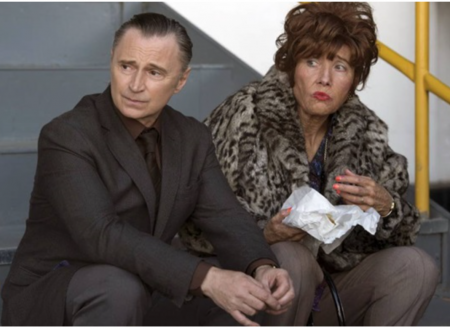 “Barney Thomson,” a Glasgow-set ensemble crime comedy rocking so many strong brogues that it’s best watched with subtitles, may be the most Scottish film to wash up on American shores since “Trainspotting.” For the record, that’s a compliment, especially since a Scottish passport is no more required to appreciate this salty dog than New York City citizenship is required to enjoy the (twentieth century) films of Woody Allen. Adapted from Douglas Lindsay’s novel The Legend of Barney Thomson, The Legend of Barney Thomson, “Barney” is the directorial debut of proud Scotsman Robert Carlyle, who’s best known for playing the unspooled misfits of “The Full Monty” and, yep, “Trainspotting.” Here he tamps down his usual fire as the titular character, a middle-aged, mullet-sporting barber widely described as having undergone a “charisma bypass.” Continue Reading →
“Barney Thomson,” a Glasgow-set ensemble crime comedy rocking so many strong brogues that it’s best watched with subtitles, may be the most Scottish film to wash up on American shores since “Trainspotting.” For the record, that’s a compliment, especially since a Scottish passport is no more required to appreciate this salty dog than New York City citizenship is required to enjoy the (twentieth century) films of Woody Allen. Adapted from Douglas Lindsay’s novel The Legend of Barney Thomson, The Legend of Barney Thomson, “Barney” is the directorial debut of proud Scotsman Robert Carlyle, who’s best known for playing the unspooled misfits of “The Full Monty” and, yep, “Trainspotting.” Here he tamps down his usual fire as the titular character, a middle-aged, mullet-sporting barber widely described as having undergone a “charisma bypass.” Continue Reading →
Archive | Film Matters
The WTFery of ‘Whiskey Tango Foxtrot’
 More than any other American film actress under fifty, Tina Fey is an old-school screen siren. In the 1940s — the era of Barbara Stanwyck and Judy Holliday; the era of dames whose appeal stemmed as much from their crackling brilliance as from their gorgeously irregular features — Fey would have been the queen of marquee. As it is, this Philadelphia native of Greek descent has been edging past Hollywood’s biases against grownup women ever since she sprang out of the “Saturday Night Live” writers room to deliver the Weekend Update in 2000. Now, in “Whiskey Tango Foxtrot,” she comes into her own like the librarian who whips off her glasses to reveal the beauty already obvious to anyone paying attention. Continue Reading →
More than any other American film actress under fifty, Tina Fey is an old-school screen siren. In the 1940s — the era of Barbara Stanwyck and Judy Holliday; the era of dames whose appeal stemmed as much from their crackling brilliance as from their gorgeously irregular features — Fey would have been the queen of marquee. As it is, this Philadelphia native of Greek descent has been edging past Hollywood’s biases against grownup women ever since she sprang out of the “Saturday Night Live” writers room to deliver the Weekend Update in 2000. Now, in “Whiskey Tango Foxtrot,” she comes into her own like the librarian who whips off her glasses to reveal the beauty already obvious to anyone paying attention. Continue Reading →
On Food TV and Our Hunger for a Hearth
 “Cooked,” Michael Pollan’s new four-part Netflix docuseries about cooking past and present, features Pollan the historian, Pollan the sociologist, Pollan the aspiring chef, and, yes, Pollan the wrangler. He may not be wagging his finger at us as emphatically as he often does (see: The Omnivore’s Dilemma, “Food Inc.”) but the journalist can’t help but shame us about our terrible habits regarding the industry, preparation, and consumption of food. Though entertainingly educational and far gentler than his usual treatises, this is not a show to watch while eating. This is a show to watch while cooking – preferably from scratch.
“Cooked,” Michael Pollan’s new four-part Netflix docuseries about cooking past and present, features Pollan the historian, Pollan the sociologist, Pollan the aspiring chef, and, yes, Pollan the wrangler. He may not be wagging his finger at us as emphatically as he often does (see: The Omnivore’s Dilemma, “Food Inc.”) but the journalist can’t help but shame us about our terrible habits regarding the industry, preparation, and consumption of food. Though entertainingly educational and far gentler than his usual treatises, this is not a show to watch while eating. This is a show to watch while cooking – preferably from scratch.
As our own cooking efforts dwindle – Pollan estimates that the average American spends twenty-seven minutes a day on food preparation, which is less than half the time spent in 1962 – the amount of hours we log watching food television and cinema is on a major uptick. On one hand, the reason hardly requires spelling out: Who doesn’t love deliciousness? But the real reasons may be closer to the bottomless hunger we feel when eating Wonder Bread. Having stripped the wheat of its original nutrition, we crave the kind of nourishment that no amount of “enrichment” can confer. Though modern life has made it possible and even pragmatic for us to eat meals we have not prepared ourselves, we benefit emotionally, physically, and spiritually from cooking in ways that continue to haunt us. Some have attempted to rectify this void by taking part in the slow-food movement. But many more have developed the habit of eating supermarket rotisserie chickens and Trader Joe’s tikka masala while watching others cook on TV and in movies. Continue Reading →
